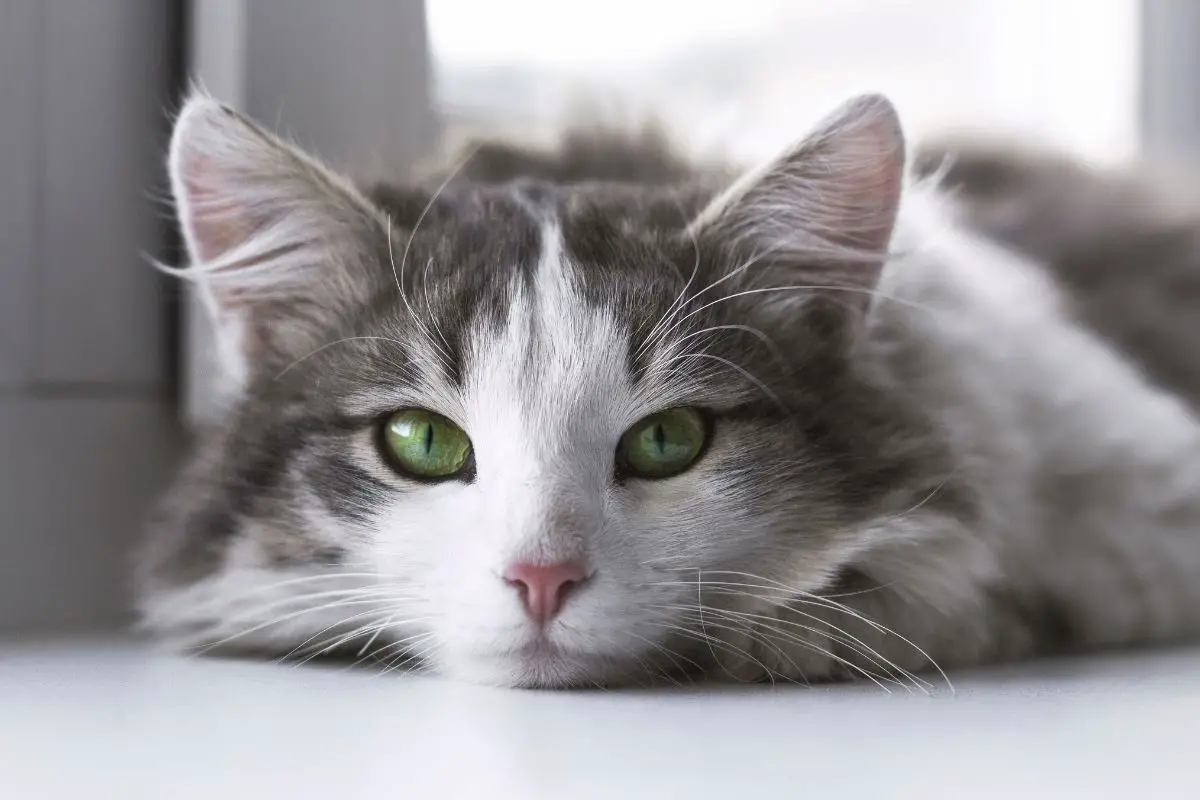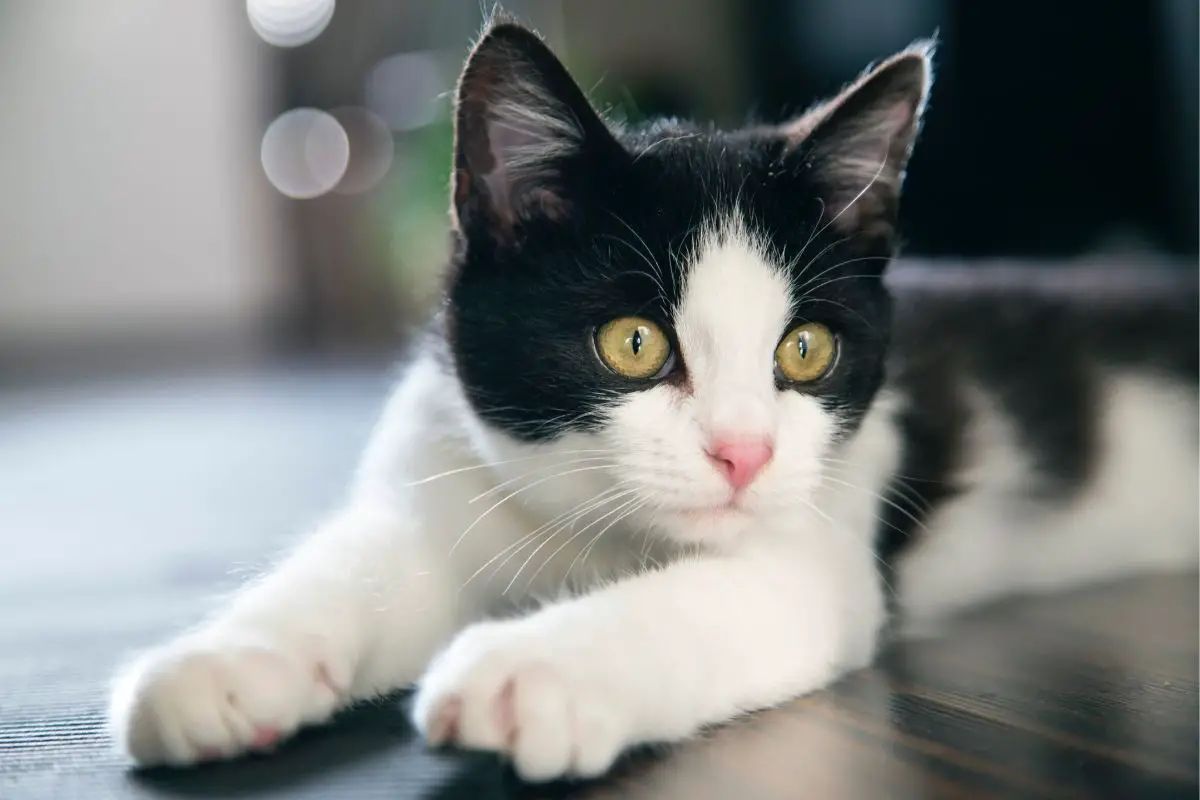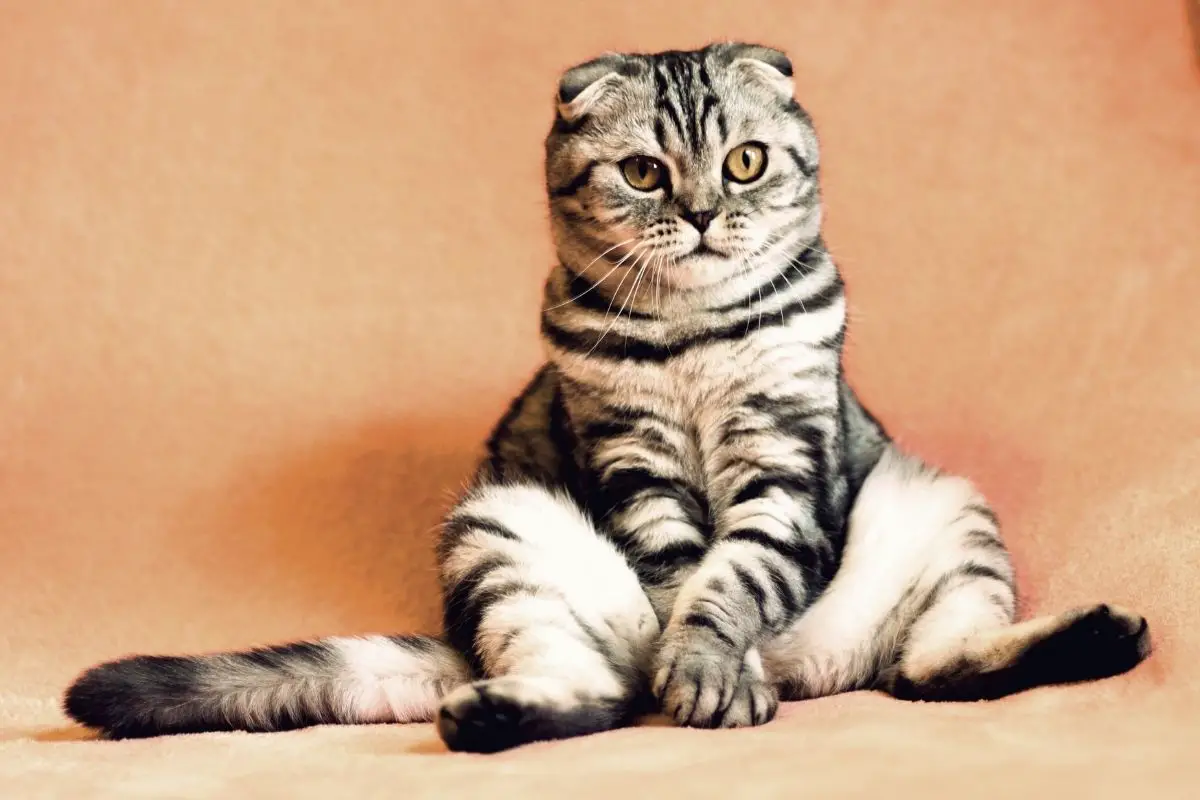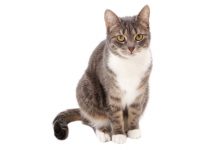Have you ever wondered why cats fart? Is it because they eat too much, or maybe their digestive system isn’t working properly?
Or, has your cat ever produced a fart that smells like death? Is it an ongoing problem?
Cats produce methane gas from bacteria in their intestines. The gas is released through the anal sphincter and out through the anus.
Most of the time, a cat will not produce smelly farts. If a cat does produce an unlikable smell, it’s likely due to the food they ate.
However, it’s important to understand that if a cat is experiencing digestive upset, and they seem to suffer from flatulence, then this could be a dangerous sign.
This can be worse if the cat is producing gas which is extremely unpleasant. While it is not always a dangerous sign, it’s critical that owners are aware of the signs of ill health in their cats.
In this article, we explain not only why cats fart, but why cats can sometimes produce gas with an unpleasant odor.
We discuss all thing’s flatulence, so you can understand your cat’s health, and look out for any possible warning signs.
It’s essential to note that if your cat is exhibiting unusual signs, including increased flatulence, or unpleasant flatulence, you should visit a vet. A vet will be able to diagnose and treat the issue.
If you want to learn about cat digestion, keep reading!
Contents
Why Do Cats Fart?
Flatulence occurs when there is a buildup of gas in the digestive system.
When a cat eats, the food passes into the stomach, where it is broken down by enzymes. Gas is a byproduct of this process.

Cats also get gas if they eat food that does not agree with them, or if they swallow too much air.
It should be noted that if the cat is experiencing gas after certain food, they may have an allergy to the food.
This could be meals or even snacks. Cats can also get allergies to pollen, dust, and pests — like ticks and fleas.
A lesser-talked-about symptom of allergies is flatulence. Allergies can cause flatulence, vomiting, and diarrhea.
If you notice that your cat is exhibiting symptoms, you should visit a vet straight away.
Symptoms Of Gas In Cats
A lot of pet owners make the mistake of thinking there is only one symptom of gas.
This symptom would, quite obviously, be the cat producing flatulence. When a cat passes gas, they do not always make a sound.
It is also not always smelt, as sometimes gas can be neutral in odor, as well as silent.
However, there are often signs of gas that cat owners need to look out for.
A major sign of gas in cats is bloating. This may not seem noticeable at first, and the pet owner might only notice bloating if they try to touch the cat. The cat’s stomach may feel bloated, and it may look uncomfortable.
The cat may not even allow you to touch their stomach, or the cat may not allow you to touch them at all. While some cats do not like being touched, the cat may also be displaying changes in their behavior.
The cat may be far less playful than usual, or the cat may stay at a distance from people. In some cases, you can notice if a cat has a bloated stomach.
This is easier to spot with a short-haired cat, as their stomach is more visible.
It is not as easy with a long-haired cat, given the hair covers much of the stomach area, it is not always easy to see bloating without gently touching the cat’s stomach.
Another sign that a cat is experiencing gas is if there is blood in the cat’s stool. When you clean the litter box, you should inspect the cat’s stool, to ensure there are no changes.
Blood is a major risk factor and is a big sign that there could be an upset with the cat. While it can be a sign of gas, it could be a sign of a more dangerous issue.
If you see blood in your cat’s stool, you should make an appointment with your doctor right away.
Another sign that a cat is experiencing gas, or digestive upset, is if the cat is drinking and eating far less than usual. This is also true if the cat is refusing to eat and refusing to drink.
While some cats are known for being picky, you should pay attention to the behavior of the cat.
Even cats that are known to be picky may eat and drink less, or even refuse to eat and drink because they are experiencing distress in their stomachs.
To summarize, here are some of the symptoms of gas in cats:
- A cat’s stomach may visibly look bloated, a cat may not want to be touched on their stomach, a cat may not want to be touched at all;
- A cat may be far less playful, or have less energy;
- Changes in behavior may be a sign that the cat is experiencing digestive upset;
- Blood in a cat’s stool is a dangerous sign;
- A cat may be drinking less, or eating less food;
- A cat may be refusing to drink, or refusing to eat — this applies to even ‘picky’ cats.
Why Is My Cat Producing Horrible Gas?
As we have already stated, it is normal for cats to pass gas. However, if a cat is passing gas with an unpleasant odor, then this may be a sign that the cat is having digestive issues.
The first step in ensuring that a cat does not have excess flatulence is ensuring that you are selecting the correct food for your cat.

The cat food should contain all the essential vitamins and minerals required for cat health. The cat should also be consuming food that is designed for the cat’s age, size, as well as level of exercise.
Ensure that any snacks and treats given to the cat are within the cat’s dietary requirements. Cats should not be eating human food.
If you think you are purchasing the correct food for your cat, but your cat still seems to suffer from flatulence, then you should visit your local vet.
As all cat owners understand, no two cats are alike. It could be that the quality of food is very high, but it is not the right food for your specific cat.
The vet may recommend a certain diet, or brand of cat food, which is more suitable for your cat.
For example, it may be that the brand of cat food you are currently purchasing contains too much fiber for your cat. Or, the brand does not contain enough fiber, and so forth.
It is important to understand that a cat producing gas, maybe a sign of something other than flatulence.
There is a range of illnesses and diseases that can cause cats to have digestive upset. While the most common signs of digestive upset are vomiting, diarrhea, and bloating — gas is another sign of digestive upset.
Could Bad Gas Be A Sign Of Another Illness?
Note that only a vet can conduct a correct diagnosis of any problems a cat may be experiencing.
While cats may suffer from flatulence for minute reasons, there may be other illnesses or diseases present, which are causing a digestive upset in the cat.
While we have discussed a range of issues and illnesses in this article, it does not mean that your cat is suffering from these illnesses or diseases.
Tritrichomonas Foetus
Tritrichomonas Foetus is a serious illness. It is an intestinal parasite that can produce an excess of vile, gassy feces.
The feces and gas will produce a very strong, unpleasant smell. If there is any vomiting and diarrhea, this is also a major sign.
If a cat is exhibiting these signs, then it should be taken to the vet straight away. The vet will likely prescribe medication that will kill the parasite.
While there are over-the-counter dewormers on the market, it is best to talk to your vet first. It may be cheaper to buy the dewormers, but they may not be the right medication for your cat.
This is because some parasites are more difficult to kill, plus, no medication will kill all parasites. You need to talk to your doctor, so they can advise you on the correct medication for your cat.
It’s important to mention that it is unlikely that your cat has a parasite, but it is not impossible.
It is crucial that a cat owner knows the signs of a parasite, but it’s also vital to remember that sometimes, a cat might just produce smelly gas.
Why Is My Cat’s Feces Smelling Horrible?
If a cat produces foul-smelling feces, it should not be ignored.
A cat may produce foul-smelling feces due to an irrational stomach.
If a cat has tried a new food product, then this can cause irritation in the digestive system. It could be that the food does not agree with the cat, which is why the feces has an unpleasant odor.
It may also be that there are bacteria in the colon which is causing the issue. Parasites, which are discussed later in the article, can also be a reason that a cat produces foul feces.
There could be other reasons a cat is producing foul feces. This could be due to an illness or disease, which a vet will need to assess.
If a cat produces unpleasant feces, you should conduct your vet. If it happens more than once, then you cannot avoid the issue and must contact the vet.
Furthermore, If the cat is also producing vomiting, diarrhea, bloating, and bad gas, then it may be an emergency, in which case you should book an emergency appointment with the vet.
When you call the veterinary office, they will be able to advise you on the issue.
How To Treat A Cat With Gas
Firstly, a pet owner needs to visit their vet for professional and medical advice. The vet will be able to give the correct advice for the cat.
All cats are different, and they will need different treatments to cure their problematic gas.
Some cats may be prescribed a range of medications that will cure the problem. It may be that they have a parasite, in which they will need medication to kill that parasite. It may also be a food allergy, in which case the pet owner should ensure the cat avoids such foods.
If the cat has an allergy to certain foods, then the vet will be able to advise what food products the cat should be eating.
It could be as simple as increasing the amount of fiber in a cat’s diet or decreasing the amount of fiber in the cat’s diet.
It may also be that the cat is sensitive to particular ingredients that are present in commercial cat food. This is common within certain cats.
There are certain ingredients, in commercial cat food, which are known to trigger gastronomical upset in cats.
This is common in cheaper brands of cat food, but these ingredients can still be present in higher-priced cat food. Ideally, cats should have cat food that is minimally processed.
Cats should not consume human food, hence the reason, cats consume ‘cat’ food. While this is a very obvious concept, many pet owners like to feed their pets human food.
Most cat owners do not give their cat’s human food out of cruelty, in fact, complete the opposite — they want the cat to enjoy the food. However, it’s actually very bad for the cat. Do not feed cats human food.
Cat food is designed in such a way that the food can break down by its digestive enzymes. Human food cannot be broken down the same way in a cat’s digestive system, and this can cause a lot of problems and discomfort for the cat.
While there are certain ‘human’ foods that cats can enjoy, if the cat seems to display any signs of discomfort after eating the food, avoid giving the cat this particular food again.
Interestingly, cats are actually quite sensitive to dairy, and even tuna. Both of these products can cause flatulence in cats.
What To Do If A Cat’s Gas Does Not Improve
If a cat’s symptoms do not improve, then the cat should be taken back to the vet.
The vet should conduct further investigation to work out the issue. It may be that the cat needs another course of antibiotics, or the last medication was not the right medication for the cat.
It may even be that the diet the cat is on is still incorrect, and you will need to alter the cat’s diet again.
There could be a misdiagnosis, and the cat may have an illness that the doctor previously did not realize. In most cases, cats producing gas is normal.
However, it should be noted that cats are not known for extremely smelly gas. When a cat produces gas, it can often be unnoticeable.
Cats do not tend to produce gas loudly, nor is the gas supposed to be unpleasant. If a cat is producing excess gas, and the gas is producing a foul smell, then talk to the vet.
If the vet is of no help, and the problem keeps occurring, then go to a different vet, and ask for a second opinion. A cat should not be producing smelly gas, and it is a sign of an issue.
The problem may not be major, and it may only require a small fix.
However, it could be a sign of a serious illness and the issue should not be ignored.
Summary
It’s normal for cats to produce gas. Gas is a normal part of life, even for cats. However, cats do not tend to produce loud, or smelly gas.
If you notice that your cat is producing horrible and unpleasant gas, then this is a sign that something is not right.
You should contact your local vet for advice. While in most situations the reasoning may be easily fixed, the cat may need medication to solve the issue.
Learn More
What Happens if you cut a Cat’s Whiskers?



